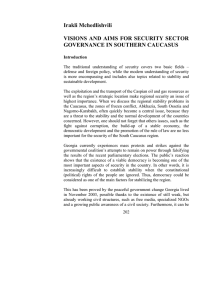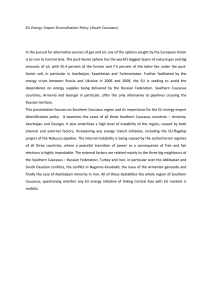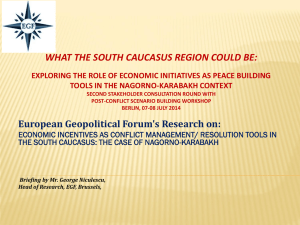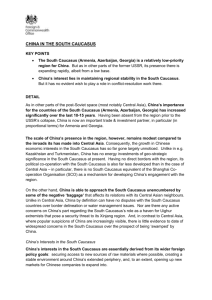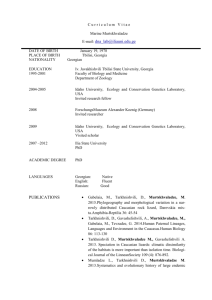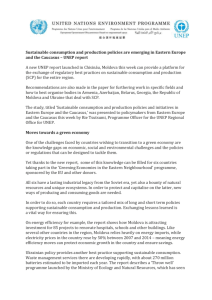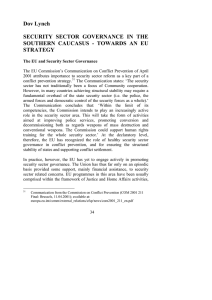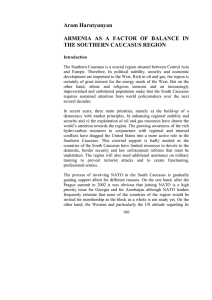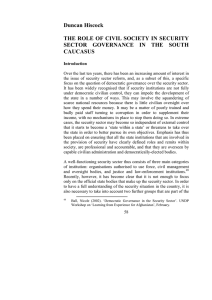Gayane Novikova SECURITY SECTOR GOVERNANCE IN THE SOUTH CAUCASUS: VISION AND AIMS
advertisement
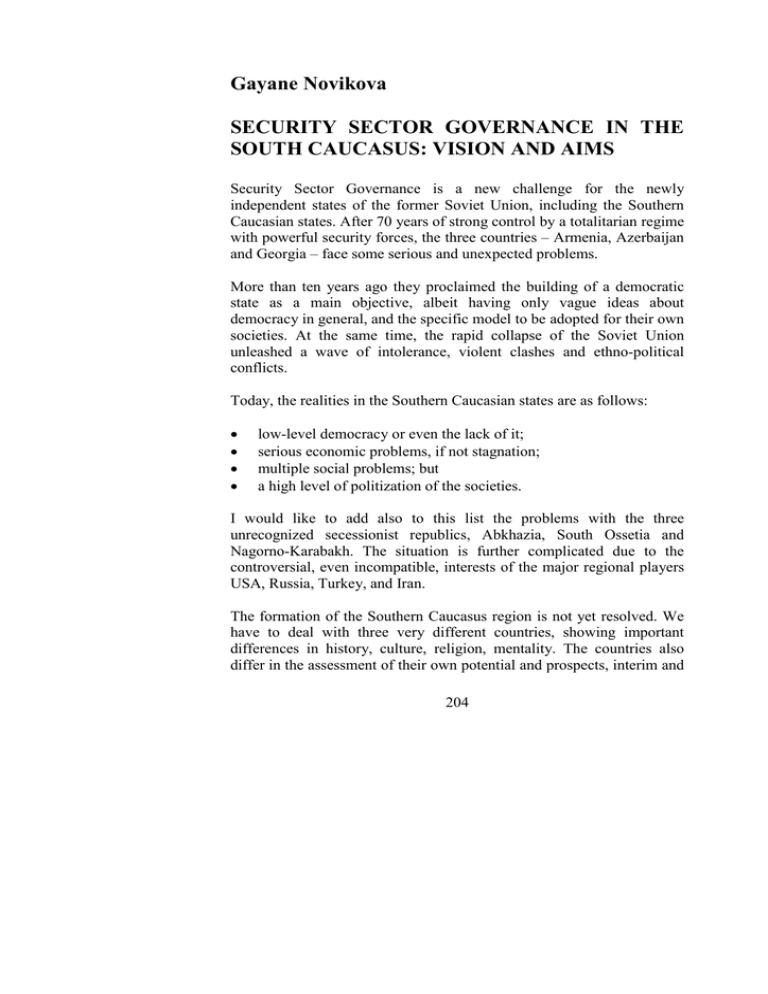
Gayane Novikova SECURITY SECTOR GOVERNANCE IN THE SOUTH CAUCASUS: VISION AND AIMS Security Sector Governance is a new challenge for the newly independent states of the former Soviet Union, including the Southern Caucasian states. After 70 years of strong control by a totalitarian regime with powerful security forces, the three countries – Armenia, Azerbaijan and Georgia – face some serious and unexpected problems. More than ten years ago they proclaimed the building of a democratic state as a main objective, albeit having only vague ideas about democracy in general, and the specific model to be adopted for their own societies. At the same time, the rapid collapse of the Soviet Union unleashed a wave of intolerance, violent clashes and ethno-political conflicts. Today, the realities in the Southern Caucasian states are as follows: · · · · low-level democracy or even the lack of it; serious economic problems, if not stagnation; multiple social problems; but a high level of politization of the societies. I would like to add also to this list the problems with the three unrecognized secessionist republics, Abkhazia, South Ossetia and Nagorno-Karabakh. The situation is further complicated due to the controversial, even incompatible, interests of the major regional players USA, Russia, Turkey, and Iran. The formation of the Southern Caucasus region is not yet resolved. We have to deal with three very different countries, showing important differences in history, culture, religion, mentality. The countries also differ in the assessment of their own potential and prospects, interim and 204 external threats, the regional security needs and security sector reform efforts. In connection with the topic of this workshop, it is necessary to note that the important differences between the three South Caucasus countries, reflected in the security sector governance, cannot be ignored: · · · First, the region might have two types of security systems: Armenia is a full member of the Collective Security Treaty of the CIS, while Georgia and Azerbaijan want to join NATO; Second, there are different types of democracy. Armenia has a strong executive branch with a weaker parliament, while in Georgia there is a strong legislative branch and a weaker executive authority, subject to destabilization during a political crisis. After the last presidential elections in October 2003, Azerbaijan can be considered as a hereditary autocracy with a very high level of corruption; Third, Armenia and Georgia can only gain stability and democracy with the perspective of a European integration. For Azerbaijan as a Muslim country maybe there is an alternative, such as integration in the Muslim world. In addition to the above mentioned differences between these states, the current “neither peace, nor war” situation in the South Caucasus has its own specifics due to the increased role of the security sector since the early 1990’s. Accordingly, it is necessary to find a balance between the security needs of each player, to take into account the regional realities and to reform the needs to reform the security sector. Without this last criteria successfully accomplished, none of the Southern Caucasus states can be considered as meeting democratic standards. Such a balance can only be found and maintained on the basis of mutual trust between all sides of the conflicts (external influence) and between the security sector and the civil authorities (internal political options). National security is the key goal for each state in the South Caucasus, implicating a strong and viable security system, based on stability and democracy. The latter two points have to be achieved if the South Caucasus states truly aspire to integration in the EU. 205 In case of the South Caucasus the main questions are: · · How to combine security sector governance with security issue; How to combine security with human rights protection? In the governance sphere the main objective is guaranteeing sovereign rights of people and the principle of non-interference of the military into internal affairs. In case of unresolved conflicts security issues are related to the settlement of the conflict and the prevention of a new conflict. In the case of the South Caucasus, the primary goal is to minimize the risk of the resumption of old conflicts. But even in more democratic countries there are some difficulties related to the control of the security sector. The struggle against terror demands an enlargement of the security sector’s duties and power. The establishment of the US Department of Homeland Security, with its extra-power, is a point in case. These events profoundly shocked the American society and entailed a process of empowering the security sector; but there is also a decrease of transparency and the infringement of human rights. In the case of the South Caucasus, the situation is more complicated. The region needs strong confidence-building measures among the main actors, based on international law. Unfortunately, there is a misbalance, caused by regional realities and domestic processes. But the main problems for the region are linked to the frozen conflicts, requiring conflict prevention, resolution and post-conflict reconstruction. Some preconditions have to be met so that security sector governance in the South Caucasus will be effective: · · · The negotiation process in Nagorno-Karabakh conflict has to restart, Azerbaijani authorities have to stop their propaganda calling for a new war over Nagorno-Karabakh; The situation in Georgia needs to be stabilized. 206 The fulfilment of these preconditions and the maintenance of the fragile regional status quo depend on the ability of the authorities of the three countries to control their security sector. This would mean to share control over the security sector with the parliament and other civil structures. But it is not sure that the authorities are ready to do so. On the other hand, the point is how to make the civil, parliamentarian control over the security sector more effective and transparent. In the meantime, and in view of the unresolved conflicts in the region, the current stability is mainly based on a military balance. This might mean that in the near future stronger control and, supposedly, less democracy would be needed. Security sector governance in the South Caucasus will not follow the same way as in the U.S., Germany, Switzerland, Austria or other democratic countries. We can speak about security sector reform in our region only as a long-term process. Otherwise the results might be very poor. Gayane Novikova Center for Strategic Analysis SPECTRUM Yerevan 207
